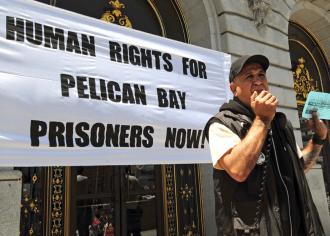
California’s Pelican Bay Prison has come under fire for violating international laws regarding the treatment of their prisoners, specifically in regards to the isolation units at the prison. After the prison was visited by Amnesty International researchers, it became clear that Pelican Bay Prison is blatantly violating the United Nations’ Standard Minimum Rules for the Treatment of Prisoners. Some of these basic rights include “access to natural light, fresh air, adequate exercise, [and] rehabilitation programs.” Furthermore, “[t]here’s an absolute obligation, under international law, for the authorities to treat prisoners humanely.”
Pelican Bay Prison has clearly breached these UN standards, as evidenced by the conditions the prisoners are exposed to while in isolation, and the length of time they spend while in isolation. In addition to the fact that those in isolation do not have access to work or rehabilitation programs, it was also found that
“Prisoners in isolation are confined to at least 22 and a half hours a day in cells measuring fewer than eight square metres. In Pelican Bay State Prison… inmates are confined alone in windowless cells with poor access to natural light. Exercise is limited to [an] hour and a half a day, alone in a bare, concrete yard with 20 foot high walls with only a patch of sky visible through a partially meshed plastic roof.”
According to figures from 2011, over 500 prisoners have spent 10 or more years in isolation, over 200 prisoners have spent over 15 years in isolation, and 78 of the prisoners currently in isolation have spent over 20 years in isolation.
While isolation is reserved for extreme cases, over 3,000 prisoners are currently being held in isolation. Those prisoners who find themselves in isolation tend to have mental illness, end up in isolation due to “minor rule infractions,” and over 2,000 prisoners currently in isolation are there because they are “members or associates of prison gangs.”
Lack of access to light, fresh air, and human contact is no doubt a cruel form of punishment, but is it totally unnecessary? Some questions to consider when looking into the issue of isolation are whether there are certain cases or people who should be confined to such constraints? Who are they, and should certain types of people not be allowed to go to isolation (such as those with mental illness or those who violate minor rules)? Should there be a time limit on being held in isolation?
SOURCES: Amnesty International, CBS San Francisco
Isolation is an entirely unnecessary form of punishment. The United Nations’ Standard Minimum Rules for the Treatment of Prisoners were made for a reason. Prisons cannot simply disobey these rules because a prisoner “is acting up”. Prison is a punishment all in itself, and being subjected to over 22 hours a day in isolation is cruel and unusual punishment. The statistics on how many inmates are subjected to long periods of isolation is astounding. The fact that prisoners have spent 10, 15, and even 20 years in isolation is actually depressing. When you are in prison, you must give up your freedom, but not your rights to live as a human being. I think this is true no matter what an inmate is in prison for. Rehabilitation is one of the main goals of incarceration. We are kidding ourselves if we think locking inmates up in eight square meter cells with no natural sunlight for years at a time will help us meet this goal. If anything this will cause the prisoners to become even more damaged and less likely to recover to the point where they can be released into society.
There is no justification for the U.S. to be violating U.N. standards regarding the treatment of prisoners. On a practical level, we would expect our citizens to be treated humanely if held in prisons in other countries, therefore it would be wrong for the U.S. to violate those same standards here. I do not think that violating minor rules should lead to an isolationist form of punishment. I think that isolation has many physical strains, mental strains, and psychological repercussions, which in itself can be used as a form of torture. Isolation should be a punishment for prisoners who are perhaps a danger to themselves or other inmates. I do understand how prisoners who are associated with prison gangs would need to stay in some type of isolation in order to dissolve the chances of the prison gangs forming or staying in power. This type of situation would only pose a danger to other inmates as well as the people guarding them. However, again there is no excuse for violating rules of international law even in these types of situations. I also agree with Alexandra that isolation, at least in certain circumstances, goes against the goal of the prison system, which is to rehabilitate. The U.S. not only needs to reform the situation at Pelican Bay, but needs to think of how to more effectively regulate isolation. The statistics on this issue are shameful, and if the U.S. expects the same respect for our citizens detained abroad then the example needs to be set in our prisons at home.